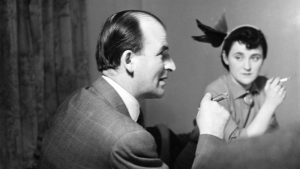Discovering Why Rachael Low Matters | Danielle Capretti
Ignorance
When I first heard Rachael Low’s name, it was one which escaped me. Surprisingly so given my keen interest in British cinema of the 1930s. I had understood that British film history was dominated by men like Alexander Korda, Cecil Hepworth and Ernest Lindgren, despite a few twinkling stars like Jessie Matthews and Anna Neagle. Who was this mysterious woman? My intrigue increased when I discovered a BFI webpage, in which prominent British film academics commented on Low’s contributions, prefacing the library event, Why Rachael Low Matters, a panel discussion at the BFI Reuben Library on Monday 10 December 2018.

Rachael Low
Credit: BFI National Archive
Enlightenment
Elaine Burrows (chairing on behalf of the Women’s Film and Television History Network) commenced the evening with a biography of Low, noting the sad fact of her very quiet passing and her absence from Who’s Who. She then proceeded to explain why these omissions were so lamentable, considering Low presided over the first major efforts to document the history of British film. Her seven volumes, with only the first co-authored by Roger Manville, were the first serious attempts to chronicle British film history from its origins to the 1930s.

Sarah Street (Bristol University) spoke about the impact of Low’s work. When completing her doctoral research in the 1980s, Street was refreshed and inspired by books authored by a woman. She also admired Low’s resourceful approach to a period that offered little British studio documentation, in which Low gleaned information from film trades and film press, using interviews from film contemporaries to verify facts. This approach inspired Street to look beyond conventional sources for information, like the National Archives.
Following her contribution, Ian Christie (Birkbeck College) proudly displayed his working copy of one of Low’s books, complete with post-its and, more importantly, Low’s autograph. He stressed that, with Low’s volumes, published between the 1940s and 1980s, the UK became the only country to have a ‘minute examination’ of its early film history, reaching beyond the anecdotal recollections that characterised previous work. Echoing Street, he also praised Low’s innovation of separating out her study into discrete subjects like the film trade, the film market and audiences.

Ruminating on the bigger picture, Janet McCabe (Birkbeck College), a co-organiser of the event with Burrows and Christine Gledhill, added that Low remains a pioneer with whom all students of British film history must grapple, regardless of their views of her work. Simply, Low continues to serve as starting point, one who invites debate and extension. Presumably, such conversations will be re-ignited by the BFI’s acquisition of a selection of Low’s papers, a few of which Nathalie Morris, BFI Senior Curator, had put on display for the audience.

Rachael Low
Credit: Duncan Melvin/BFI National Archive
Reflection
These introductory remarks prompted a lively discussion amongst the British film scholars in the audience. What were Low’s attitudes and reactions to being the sole woman, and a young one, to the prominent men around her? What influences informed Low’s filmic judgements? How would have British film history developed without Low’s contribution? One thing was evident—work published many years ago is still inciting debate, one in which Low’s daughter, Madeline Watt, who was also in attendance, joined.
Personally, I was also reflecting on how Low influenced the academics before me. Having read and quoted Professor Street in several papers, I have benefited from her efforts to present a complete picture of the film histories of the 1930s, through her thorough examination of less obvious sources. As a student of Professor Christie, I can appreciate how Low’s writings were a valuable starting point for his own achievements in documenting early British cinema.
Ultimately, a trip to the BFI Library for complete immersion in the volumes of Rachael Low, pioneer of British film history, is in order. Whether lauding or deploring their contents, one cannot deny that her work revolutionised the way British cinema was presented for the first time as subject worthy of serious academic study.

